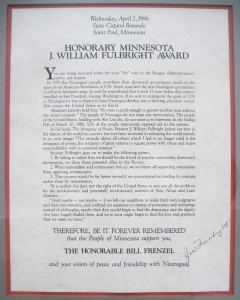“Popular candidates like Andy Dawkins sometimes receive
national recognition. Fiorello LaGuardia, Earl Warren,
Ronald Reagan, and Franklin Roosevelt are names that
come readily to mind as candidates whose reputations and
political careers were enhanced because they appeared on
election ballots as fusion candidates.”
Justice Stevens in Timmons vs. TC New Party
I arrived my first day at The Capitol as State Rep. Andy Dawkins filled with tremendous hope, optimism, excitement, joy, anticipation. All my life I’d dreamed the impossible, maybe I could be President of the United States someday. Now it seemed possible. Only to be greeted – at the first private meeting of just Democrats (called a “caucus”) – with one of my brand-new colleagues saying, “Well, if it isn’t ‘Andy Sandanista.’” The attempt to marginalize me began the moment I arrived.
The voters in my District elected me in part because I had promised them I would be the hardest working and most progressive legislator at The Capitol, and I had a resume to back that up. In the years before getting elected I was one of many local peace activists building political pressure to stop “contra aid,” the practice of the U.S. sending supplies to the insurgents fighting to topple the popularly-elected Sandanista (socialist) Government in Nicaragua. Having now been elected didn’t mean I had to leave my politics at The Capitol Door; it just meant I had to re-focus from national issues to state and local issues. This was fine with me, and I had a whole batch of ideas for new laws, some thought of by my neighbors themselves, to make St. Paul safer and greater.
However, in the years before getting elected I’d been in the news more for national politics. I was prominent in getting then-Gov. Rudy Perpich to sue the U.S. Government arguing that any deployment of the State National Guard had to be made by the Governor, not by the national government, whether for contra aid or otherwise. I had defended, as their lawyer, a group of sit-in protestors, at then-Sen. Rudy Boschwitz’s office, on charges of trespassing. Just the year before I’d convinced Sen. J. William Fulbright to personally sign and autograph five letters on parchment paper, each looking like the U.S. Constitution, one each for the five members of the Minnesota Congressional Delegation, praising them for their recent votes against contra aid.
Sen. Fulbright, then retired, was the former Chair of the U.S. Senate Foreign Relations Committee; the man the scholarship program is named for; and author of The Arrogance of Power, a book I’d read in college forcefully arguing that the place for the United States in Central America was with the people, supplying farm aid, infrastructure aid, education aid; rather than supplying military aid to forces fighting the government they had elected. I convinced Sen. Fulbright by telling him I would put the letters under glass, in a gold frame with a red border, and hand them out as Awards in a ceremony to be held at The State Capitol Rotunda. The Awards Ceremony went great, maybe not quite as much publicity as we would have liked, but 4 of the 5 Congressmen (they were all men then) showed-up to receive their awards – and only one of them changed their vote later – but I got that guy’s Fulbright-signed letter back and it’s on my wall now – Wow! Not only do I have Nellie Fox and Kirby Puckett signed autographs, I’ve got a J. William Fulbright!
Tomorrow: The Neighborhood’s Agenda

